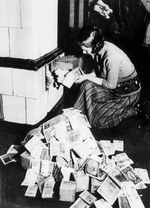I think so. Look at gold. Yes, I know it has some practical industrial uses, but mostly it just looks pretty and is fairly rare and hard to find. Everyone accepts that it's valuable, so it is. I don't think it had any practical use at all in antiquity and it's been valuable at least since then.
To understand this, first we must look at how money came to be. It wasn't just a light bulb moment for some King, it was a gradual, social development.
There were 2 competing theories of money's origins:
1) The commodity theory
2) The credit theory
Both of these are correct, depending on how you define what money is.
Early money was credit:
Before agriculture, people lived in tribes, that rarely exceeded a few dozen people, Dunbar's number. Everyone knew everyone else - humans are very good at facial recognition for this reason. Before we even had words, or names, we could remember who was who, because it was crucial in social cooperation for survival.
If a hunter brought a deer for the tribe, everyone in the tribe knew he contributed a great deal of his time, and effort and skill to do that. If later, that hunter became sick or injured and needed help, he had some credit with the tribe to receive their time and effort, in food and care, until he is again well enough to contribute. With a small number of people, our brains can automatically keep up with this credit system, without much effort at all (no writing, no numbers, and very early on, no language). This is how we cooperated and socially enforced a system that kept humanity alive for 100,000 years or more.
Credit works great when the people you have credit with are familiar, and will always be around until you or they die. But what if you meet someone from another tribe, across the canyon, that you may never see again. There would be no reason to share a kill, or anything, with that person because you will never see a benefit in return, and if you are yourself in need of something and encounter some stranger from a strange land, you have nothing to offer him for his help. This brings us to:
Commodity money:
There is an odd program in our brains that causes us to do something no other animal does: we collect things, like shells, or feathers, because they are interesting and pleasing. It doesn't at first glance, improve survival, or comfort. Even better to collect things that we think other humans will desire too. So if I need something from a stranger, and they are already well fed, well clothed, and have a nice spear....what can I offer? How about this shell, which is beautiful, and rare, because we are 1,000 miles from the sea. Have you or anyone from your tribe ever seen something like this? Over thousands of years, different things take on the role of money, depending on the level of civilization and the need for exchange between them, mainly after the birth of agriculture about 8,000 years ago.
Credit money in early civilizations:
After agriculture, people were able to settle in one place, and have more people in one band than the human brain can keep track of. Now numbers, and writing come along, and allow a credit system to exist. How much grain you need to provide the group, come harvest time. With numbers, and writing, credit works on a large scale, and is very efficient. But it doesn't work with the neighboring tribe. This is where commodity money comes in.
Just like now: credit money works in high trust scenarios, and is more efficient. Commodity money is used when trust is low, and is less efficient. Notes, or also fiat, is a credit money. Trust is needed that the issuer will either pay in gold, or in the case of fiat, that it will be accepted as money when you want to use it. Bitcoin and gold are commodity moneys. They are the collectible that is desired, not a promise to pay that collectible in the future.
People confuse the fact that the dollar is digital (ostensibly "backed" by oil or guns), and Bitcoin is digital, that the fact the Bitcoin is not "backed" by anything is a flaw. But it doesn't need to be, because it is rare and collectible, like all other commodity moneys were. The fact that it is rare is the other thing that is hard to grasp, being digital. Everything else we know of can be infinitely copied, for free, digitally. That may be the biggest hurdle for the Boomer generation, is grasping digital scarcity. There have been so many affinity scams since Bitcoin was invented, that many people believe that digital scarcity is NFTs and monkey jpegs that can be infinitely copied, are the same as Bitcoin.
I'm sure this was disjointed and probably only 80% accurate.
To understand Bitcoin, you must first understand what money is. To understand what money is, its helpful to study its origins. I highly recommend either
The Bitcoin Standard and
The Fiat Standard, by Saifdean Ammous, and/or
Broken Money, by Lyn Alden.
@Australia Sucks thank you for the discussion, you are helping me hone my ideas, and I hope I'm doing the same for you. Having a long form discussion like this is difficult in meat space because so few people know enough or care enough about this subject.



